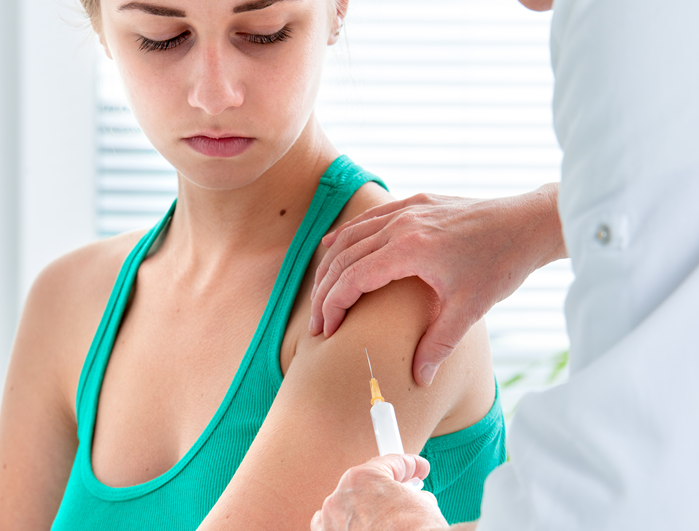How the cervical cancer vaccine is given:
The cervical cancer vaccine is given as an injection by a nurse at 132 Harley St. It is an injection given through the skin into the muscle that you can have in your arm, thigh or bottom. You will be given an injection 3 times within a 6-12months.
First injection: at chosen date
Second injection: ideally 2 months after first injection
Third injection: ideally 6 months after first injection
You should complete the three-dose vaccination course; otherwise you will not be fully protected.
If you forget to take the cervical cancer vaccine:
If you miss a scheduled injection, your doctor will decide when to give the missed dose. It is important that you follow the instructions of your doctor or nurse regarding return visits for the follow-up doses. If you forget or are not able to go back to your doctor at the scheduled time, ask your doctor for advice. If you have any further questions on the use of this product, ask your doctor or pharmacist.
Possible side effects:
Like all vaccines and medicines, Gardasil can cause side effects, although not everybody gets them. The following side effects can be seen after the use of Gardasil:
-
Very commonly (more than 1 in 10 patients), side effects found at the injection site include: pain, swelling, and redness. Fever was also seen.
-
Commonly (more than 1 in 100 patients), side effects found at the injection site include: bleeding, itching.
-
Very rarely (less than 1 in 10,000 patients), difficulty breathing (bronchospasm) has been reported.
-
Rarely (less than 1 in 1000 patients), hives (urticaria).
If any of the side effects gets serious or if you notice any side effects not listed, please tell your doctor or pharmacist.
Do not use the cervical cancer vaccine if you:
-
Are allergic (hypersensitive) to any of the active substances or any of the other ingredients of Gardasil.
-
Have developed an allergic reaction after receiving a dose of Gardasil.
-
Suffer from an illness with high fever. However, a mild fever or upper respiratory infection (for example cold) itself is not a reason to delay vaccination.
You should tell your doctor if you:
-
Have a bleeding disorder (a disease that makes you bleed more than normal), for example haemophilia
-
Have a weakened immune system, for example due to a genetic defect or HIV infection
As with any vaccine, the cervical cancer vaccine may not fully protect 100% of those who get the vaccine. The cervical cancer vaccine will not protect against all types of Human Papilloma virus. Therefore appropriate precautions against sexually transmitted disease should continue to be used. The cervical cancer vaccine will not protect against other diseases that are not caused by Human Papilloma virus. Vaccination is not a substitute for routine cervical screening. You should continue to follow your doctor's advice on cervical smear/Pap tests and preventative and protective measures.
What other important information should I know about Gardasil:
The duration of protection is currently unknown. Longer term follow-up studies are ongoing to determine whether a booster dose is needed.
Taking other medicines:
The cervical cancer vaccine can be given with Hepatitis B vaccine at a separate injection site (another part of your body, e.g. the other arm or leg). The cervical cancer vaccine may not have an optimal effect if used with medicines that suppress the immune system.
In clinical trials, oral or other contraceptives (e.g. the pill) did not reduce the protection obtained by the cervical cancer vaccine.
Please tell your doctor you are currently taking any other medicines, including medicines obtained without a prescription.
Pregnancy and breast-feeding:
Consult your doctor if you are pregnant, trying to become pregnant or become pregnant during the course of vaccination. The cervical cancer vaccine may be given to women who are breast-feeding or intend to breast-feed.
Driving and using machines: There is no information to suggest that Gardasil affects your ability to drive or use machinery.
Further Information
If you would like the cervical cancer vaccine, please call 132 Harley Street on 02075631850. Or if you have any further questions on the cervical cancer vaccine, please speak to your doctor or nurse at 132 Harley Street.



